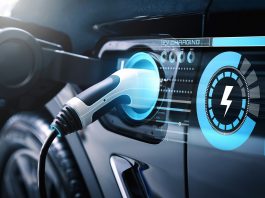The Advanced Propulsion Centre details Project Trident and its commitment to developing the next-generation propulsion technologies that can realise zero-emission heavy-duty vehicles.
In the pursuit of decarbonisation, the transport industry stands at a crucial juncture. With the pressing need to reduce greenhouse gas emissions, innovations in propulsion technologies have become imperative.
The UK automotive industry is committed to the 2050 target of net zero and the first goal of removing CO2 and harmful emissions from vehicle use. Significant research and development (R&D) is underway to develop zero-emission heavy-duty vehicles (HDV), with the most recent and promising result being the e-turbo.
Gareth Purdy, Senior Project Delivery Lead at the Advanced Propulsion Centre UK (APC), looks at a leading APC-supported project that is unlocking the potential of e-turbos, their application in heavy transport, and their pivotal role in redefining the efficiency landscape of thermal propulsion powertrains.
The heavy-duty problem
The heavy-duty industry generates £15.8bn in revenue, £3bn Gross Value Added, and is responsible for UK exports of £11.8bn, while European exports generate 39% of revenue. The UK has several strengths in the heavy-duty market, particularly vehicle and engine research and development (R&D) and manufacturing. The UK off-highway construction equipment sector is particularly strong, considered first in Europe and fifth in the World.¹
Vehicles that fall under the HDV category, 3.5 tonnes and above, have a much greater diversity than consumer-focused passenger cars and light-duty vehicle equivalents. Businesses treat these vehicles primarily as capital equipment, valuing long life, durability, uptime, and utility. Reliability of service is key to maintaining credibility with suppliers. Reputation is a major factor in vehicle choices for some fleets, where customer perception may drive an earlier transition to a zero-emission fleet than organisations with less scrutiny from their customer base. There is a much greater customisation of vehicles to suit each user’s case. Within the weight categories, there is a broad spectrum of power, onboard energy storage, and refuelling, including remote fuelling needs.
When considering the transition to net-zero heavy-duty vehicles, zero-emission technology solutions need to be both practicable and suited to the user case. There is no one-size-fits-all approach that could replace the current universality of diesel.
Project Trident
Electronic turbos (e-turbos) are emerging as game-changers in internal combustion engines (ICE) and the promising realm of hydrogen fuel cell technology. In 2021, Cummins Ltd, Aeristech, Holtex, and the University of Bath (IAAPS) were awarded £10m in government and industry funding through APC’s Collaborative Research & Development competition, enabling the consortium to accelerate the development of air handling technologies for hybrid and fuel cell platforms. Cummins, Aeristech, Holtex and IAAPS worked together to develop the proprietary development of tools and analytical methodology required to translate to scale-up. In doing so, the project created a base platform and integrated architecture specifically optimised for e-machine componentry. From this, the project realised integrated full system prototypes and the appropriate series manufacturing and supply chain processes, which supported the delivery of customer-ready demonstrators.
One of the key outputs of the project, along with the technical development, was to develop the supply chain through collaboration – a key principle for the APC – and anchor the new capability and capacity into the UK to extend the opportunity into the component value chain.
Trident’s radical full-system approach joins up parallel technology, materials and manufacturing breakthroughs in all key components and subsystems through proprietary modelling/scale-up tools. Using toolsets and unique expertise, the project can realise disruptive base aerodynamic, rotor-dynamic, and e-machine platforms and common architectures to optimally integrate all new technologies to maximum advantage. All this whilst delivering further efficiency gains leveraging novel effects from broadening the integration envelope to after treatment.
By redefining the practical limits of system efficiency across multiple thermal propulsion powertrains as well as system level efficiency at the vehicle level, the project expects to deliver significant savings of CO2 and fuel consumption improvements for ICE-based platforms such as hybrids, natural gas vehicles, and reduced-emission diesel variants..
E-turbos can explore new areas for efficiency and performance gains in turbocharging technology. Unlike traditional turbochargers, which rely on exhaust gases to spin a turbine and compress intake air, e-turbos integrate electric motors to augment turbocharger performance. This integration allows for instantaneous boost response, eliminating turbo lag – a longstanding challenge in traditional turbocharging systems. Moreover, e-turbos offer precise control over boost pressure, enhancing engine efficiency and power output.
Revolutionising the heavy-duty transport sector
The adoption of e-turbos holds immense promise in the heavy-duty vehicles sector. From freight trucks to buses, heavy-duty vehicles are significant contributors to carbon emissions. Transport is the largest emitting sector of greenhouse gas (GHG) emissions, producing 26% of the UK’s total emissions in 2021 (427 MtCO2e).² The biggest contributors to this were cars and taxis, which made up 52% of the emissions from domestic transport (57 MtCO2e), Heavy Goods Vehicles (HGVs) (20% of domestic transport emissions, 21 MtCO2e), and vans (17% of emissions, 18 MtCO2e).

By incorporating e-turbos into heavy transport vehicles, manufacturers can substantially improve fuel efficiency and reduce emissions. The benefits extend beyond environmental considerations, encompassing operational efficiency and cost-effectiveness.
Central to the development of future e-turbo platforms and a direct benefit from the project is the utilisation of advanced simulation and modelling. The project partners leverage advanced computational tools to refine design parameters and predict system behaviour in the quest for optimal performance and emissions reduction. Simulation-driven development toolsets enabled the consortia engineers to optimise e-turbo performance across diverse operating conditions iteratively. Moreover, these tools play a pivotal role in the development of next-generation propulsion technologies, including hydrogen fuel cells. By simulating complex processes and fluid dynamics across a multitude of existing powertrains, fuel cells, hybrids, and alternative fuels, the developers can accelerate the transition to CO2-free propulsion systems. The turbocharger heat transfer model takes compute time for simulation from hours on a supercomputer to minutes on a laptop.
The heavy transport industry is diverse, and there is no one-size-fits-all approach to decarbonising. The demands placed on propulsion systems are formidable. To thrive in this domain, e-turbos must meet stringent criteria for cost performance, operational availability, design life, and reliability. Manufacturers are tasked with engineering solutions that not only deliver superior performance but also withstand the rigours of extreme applications. Through advanced materials, robust design methodologies, and rigorous testing protocols, e-turbo technology is rising to meet these challenges head-on.
The integration of e-turbos is redefining the practical limits of system efficiency across multiple thermal propulsion powertrains. Whether in conventional ICE platforms, hybrid vehicles, or emerging hydrogen fuel cell technology, e-turbos offer unparalleled gains in efficiency. E-turbos contribute to significant reductions in CO2 emissions and fuel consumption by optimising air-fuel ratio and combustion dynamics. This holistic approach to system-level efficiency underscores the transformative potential of e-turbo technology in the transport industry.
The UK’s e-turbo potential
In the UK, the adoption of e-turbo technology presents a unique opportunity to bolster the domestic supply chain and safeguard jobs. Project Trident has demonstrated this by creating roles in this new field. As a direct output from Trident, the project partners are already looking to invest further in the development of new relevant platforms, both with current customers and in the longer-term view of innovative new fuel cell platforms, as the demand for skilled labour and specialised expertise surges.
Project Trident has demonstrated a proactive approach to nurturing a robust research, development, and manufacturing ecosystem. With this, the UK can position itself as a global leader in sustainable transport solutions. Moreover, the convergence of e-turbo technology with hydrogen fuel cell platforms holds immense potential for driving innovation and economic growth in the UK’s automotive sector.
The project’s conclusion allowed the project partners to reflect on a well-earned lesson learned. Not only had the project superseded expectations in aspects of the project deliverables, but this was done during the COVID-19 period when new ways to collaborate had to be defined in order to remain agile in an R&D environment.

The dawn of electronic turbos represents a pivotal milestone in the journey towards decarbonisation in the transport industry. From revolutionising internal combustion engines to enabling the transition to hydrogen fuel cell technology, e-turbos are reshaping the efficiency landscape of thermal propulsion powertrains. As manufacturers embrace this transformative technology, they must navigate the demands of heavy-duty vehicles applications while striving for continuous improvement in performance, reliability, and emissions reduction. Through simulation-driven innovation and strategic investment, the UK stands poised to lead the charge towards a greener, more sustainable future in transportation.
About the Advanced Propulsion Centre
The Advanced Propulsion Centre UK (APC) collaborates with the UK government, the automotive industry, and academia to accelerate the industrialisation of technologies and support the transition to deliver net-zero emission vehicles.
Since its foundation in 2013, APC has funded 264 low-carbon projects involving 492 partners, working with companies of all sizes. These projects will have helped to create or safeguard over 58,000 jobs in the UK. The technologies developed in these projects are projected to save over 410 million tonnes of CO2.
With its deep sector expertise and cutting-edge knowledge of new propulsion technologies, APC’s role in building and advising project consortia helps projects start more quickly and deliver increased value. In the longer term, its work to drive innovation and encourage collaboration is building the foundations for a successful and sustainable UK automotive industry.
In 2019, the UK government committed to the Automotive Transformation Fund (ATF) to accelerate the development of a net-zero vehicle supply chain, enabling UK-based manufacturers to serve global markets. ATF investments are awarded through the APC to support strategically important UK capital and R&D investments that will enable companies involved in batteries, motors and drives, power electronics, fuel cells, and associated supply chains to anchor their future.
References
- https://eu.eventscloud.com/file uploads/0318d7f08e1c8ffb2d120ca57742a5c1_CEAReport2019A4Small.pdf
- Transport and environment statistics: 2023 – GOV.UK (www.gov.uk)
Please note, this article will also appear in the 18th edition of our quarterly publication.









